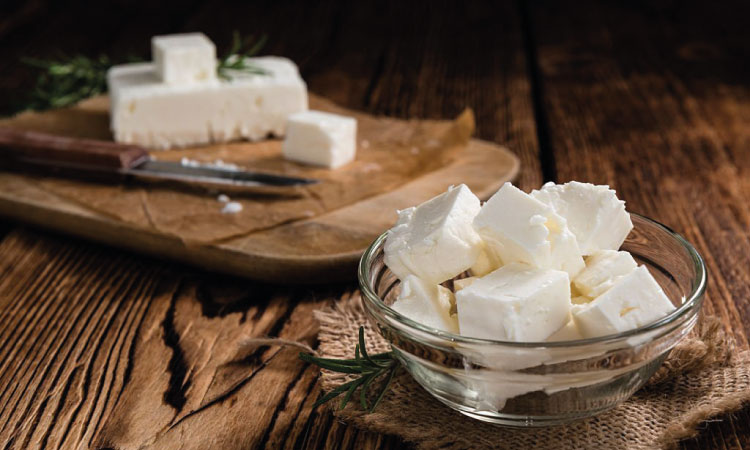Pregnant women are encouraged to consume milk and milk products, including cheese, especially if they are vegetarians. This is because milk is a significant source of protein, and as a result, the products made from milk are also significant sources of protein. Getting enough protein during pregnancy is very important. Cheese is available in a wide variety of flavors, textures, and tastes. It also comes in a variety of colors. Not all cheese is safe to eat while pregnant, either! Can pregnant women eat Feta cheese? Feta is one of those wonderful cheeses that can be added to salads and pizzas, or even eaten as a snack. Feta cheese is delicious and pairs well with a variety of foods, so it is not surprising that pregnant women crave it. As such, “how safe is Feta cheese during pregnancy?” and “what if I eat Feta cheese during pregnancy?” are two very common questions that arise among pregnant women.
What Is Feta Cheese?
Feta cheese is a kind of Greek cheese that is crumbly and soft, made traditionally out of sheep’s milk. As such, it naturally contains twice the amount of fat found in cow’s milk. In some cases, Feta cheese may also be made out of a combination of sheep’s milk as well as goat’s milk. In Greece, it is left to cure in salty brine, and so it is also known as ‘pickled cheese’. The flavor becomes saltier and sharper as it ages. It is crumbly with small holes and is creamy white. Though it is costlier than regular cheese, the additional price is said to be worth it due to all of its benefits.
Since Feta cheese crumbles rather easily, it is said to be a wonderful addition to salads in place of traditional cheeses. In addition to this, Feta on pizza while pregnant can also be a suitable substitute for traditional cheeses like Mozzarella. This applies to flatbreads and other such dishes too.
How Is Feta Cheese Made?
As mentioned earlier, it is made out of either sheep’s milk or a combination of sheep’s milk and goat’s milk. That being said, mass production of Feta cheese in modern times may also rely on cow’s milk, skimmed milk, or partially skimmed milk in order to reduce the amount of fat present in it.
One common question that arises is “is Feta cheese pasteurized?” The traditional method of production of Feta cheese begins by adding casein and rennet to either raw or pasteurized sheep’s milk, goat’s milk, or a blend of both. As the milk begins to thicken, the curd formed is separated and pressed into molds, after which all excess whey is drained out. At this point, the Feta is cut into smaller blocks (as indicated by its name, “Feta” meaning “sliced” in Greek). They are then salted and dried for a couple of days, after which they are submerged in brine, where they will be aged for a duration ranging from a week to several months.
Related Reading: Top 10 Protein-Rich Foods For Pregnancy
Feta Cheese: Nutritional Facts
According to a source:
- There are 21.3 grams of protein in one cup of Feta cheese. This makes Feta cheese a respectable source of protein because it makes up 43% of the daily requirement
- Feta cheese has a high calcium and vitamin B12 content. Depending on how Feta cheese is made, it can have different amounts of salt and fat. About half of the fat in Feta cheese is saturated fat, no matter how it is made. Additionally, Feta cheese has a high sodium content. Feta should not be consumed on a salt-restricted diet due to its high sodium content, which is a result of the cheese’s immersion in brine
- Feta is extremely low in carbohydrates. This is due to the fact that it contains almost no sugar and fiber. It is rich in riboflavin, phosphorus, and vitamin B12, among other essential nutrients
- In addition, copper, zinc, manganese, and selenium, as well as vitamin B6, can be found in Feta cheese. In addition, it contains relatively low quantities of iron, magnesium, potassium, and vitamin A
Can Pregnant Women Eat Feta Cheese?

In terms of pregnancy food safety, Feta can be tricky to determine if it’s safe to consume. While some claim it is safe to eat ‘normal’ hard, crumbly Feta cheese occasionally during pregnancy if it is made with pasteurized milk, the Australian guidelines still tend to advise against it1.
Calculate Due Date With LMP
The majority of Feta is technically made from pasteurized milk, so it should be safe to consume during pregnancy. The fact that Feta cheese belongs to the category of soft cheeses, is one of the primary reasons why it is frequently included on lists of foods to avoid during pregnancy. All soft cheeses, regardless of whether they are pastured or not, pose a risk of listeria and should be avoided during pregnancy.
However, you may be able to satisfy your Feta cheese craving during pregnancy. There is a safe way to eat Feta cheese while pregnant. What is the catch? It’s all you have to do is cook it. According to source, pregnant women can consider their Feta listeria-free if the internal temperature reaches 75 degrees Celsius. On the other hand, if the Feta is very soft, it is probably best to steer clear of it, even if it was made with pasteurized milk.
Related Reading: 12 Early Pregnancy Tips To Avoid Miscarriage
Top Concerns When Eating Feta Cheese During Pregnancy
Since Feta cheese is a brined curd variety of white cheese, it contains a wide variety of probiotics in addition to other essential nutrients. Despite the fact that it is low in calories and contains a variety of vitamins and minerals, Feta cheese also contains high amounts of saturated fats and sodium. In addition to this, it presents a number of potential health risks that cannot be ignored during pregnancy.
1. Risk of listeriosis
Feta cheese contains a certain bacteria known as Listeria, which is known to cause listeriosis – a rather severe kind of food poisoning. It is especially capable of affecting people with weaker immune systems. And since the immune system of a woman can be quite weak during pregnancy, this puts them at a higher risk.
Since it’s a soft cheese, it’s better to be avoided as soft cheese is on our list of foods that might cause miscarriage. After the second trimester, contracting listeriosis paves the way for other complications such as stillbirth or preterm labor may also arise. There may even be a risk of the infection passing to the baby.
2. High sodium content
Feta cheese is known to have high amounts of sodium, which is shown to contribute substantially to causing high blood pressure. This, if left unchecked, may lead to several complications during pregnancy.
3. Risk of allergies
Cheese allergies are not too uncommon. They are quite similar to milk allergies and are caused by the proteins found in cheese—usually whey or casein. In addition to this, Feta cheese can also cause wheezing, an upset stomach, hives, itchy and irritated skin, or, in extreme cases, even anaphylaxis.
4. Putting your heart at risk
Roughly two-thirds of the fat found in Feta cheese is saturated. Though this is mostly harmless in smaller quantities, consuming excessive amounts (roughly more than half a cup per day) may dramatically spike your cholesterol levels and put your heart at risk.
A few other cases where you ought to avoid pasteurized Feta cheese during pregnancy, or otherwise are:
- If you suffer from digestive issues
- If you are likely to experience breakouts of acne
- If you already struggle with lactose intolerance
Related Reading: Causes, Signs And Remedies For Food Poisoning During Pregnancy
What To Do If You Ate Feta Cheese During Pregnancy?

There is no cause for panic if you have accidentally consumed uncooked Feta cheese during pregnancy. The chances of contracting listeriosis are notably low in the case of most commercially available Feta cheeses. Nonetheless, if you experience any of the symptoms of listeriosis, you should seek immediate medical attention. There are blood tests that can determine whether someone has contracted listeriosis.
How To Make The Right Choice?
Truth be told, there is no alternative to fresh, pasteurized Feta cheese acquired straight from the farm. If you are purchasing it from a grocery store, be sure to check that the label says it’s pasteurized. In case you are uncertain about what brand to go for, feel free to consult your physician or dietician for their opinion, as they are likely to be more well-informed regarding this subject. Here are a few things to do when you are shopping for Feta cheese:
- Feta cheese is aged and stored in brine (a solution of salt dissolved in water), but once it has been opened, it can quickly dry out or spoil
- The healthiest Feta cheese is one that has been pasteurized and comes from grass-fed cows. Ensure that the label indicates this
- Make sure that the particular brand you are going for contains no added sugar, salt, or any other ingredient that may cause problems later
- The smell can be a good indicator of whether or not it is spoiled. Be sure to conduct an appropriate smell test
- Recognize that once opened, Feta cheese has a shelf life of approximately five days (that is if stored well)
- Brined Feta cheese lasts for about four to six weeks once opened, as long as the cheese remains submerged in the brine
- Make sure that the Feta cheese has not turned slimy, as it is a clear indication of spoilage
- Make sure that the cheese contains no allergens, and was not processed at a plant that processes allergens, such as nuts
Conclusion

Without a doubt, Feta cheese is among the healthiest and most delicious cheeses available. Though it does have a fair number of risks and side effects associated with it, there should be no problem to consume it in moderate amounts. It can even offer a number of nutritional benefits that would be especially helpful during pregnancy. Just be sure to not consume it in excess, purchase fresh Feta from a trusted brand, and make sure it is pasteurized and does not contain additional undesired ingredients that may cause you harm. It is highly recommended that you take the opinion of your doctor or dietician while picking the brand.
FAQs
As is the case with most available cheeses, Feta cheese must not be left out at room temperature at any cost, as it will more than likely develop harmful bacteria and mold.
In case it was left outside in the package, it would not be safe for consumption after six hours. Within those six hours, it is more likely to become dry than spoil, though this can depend greatly on the amount of salt present.
No. Unlike hard cheeses, it is not possible to scrape off mold from softer cheeses like Feta cheese, as attempting to do so will more than likely cause the mold spores to spread throughout the entire cheese within its container, rendering the whole thing inedible.


